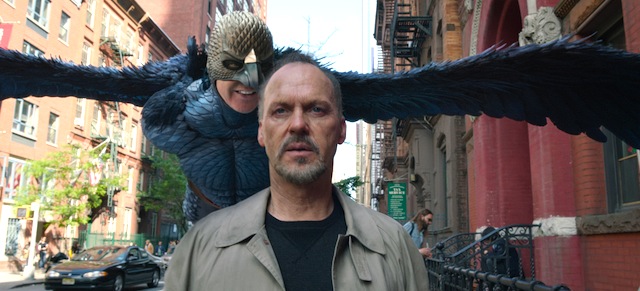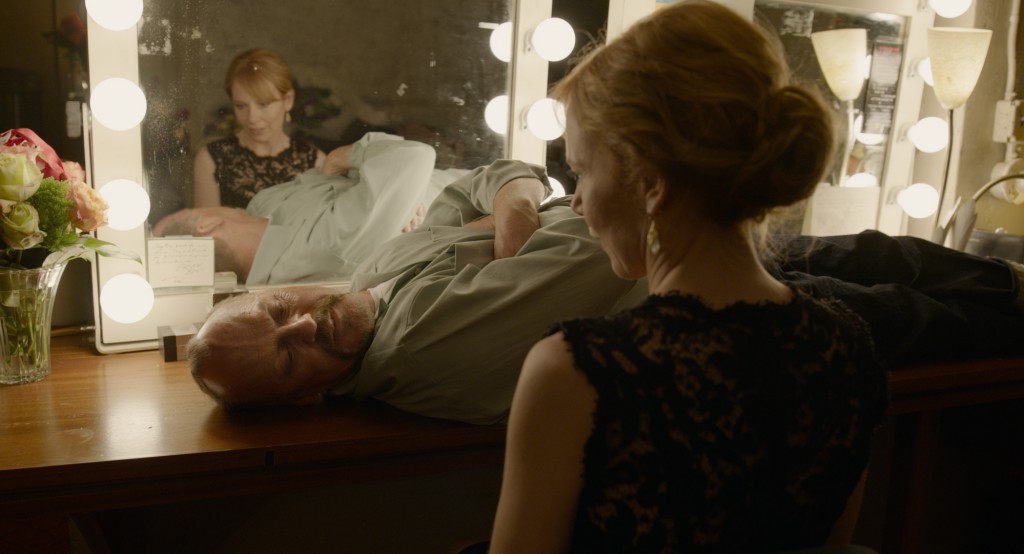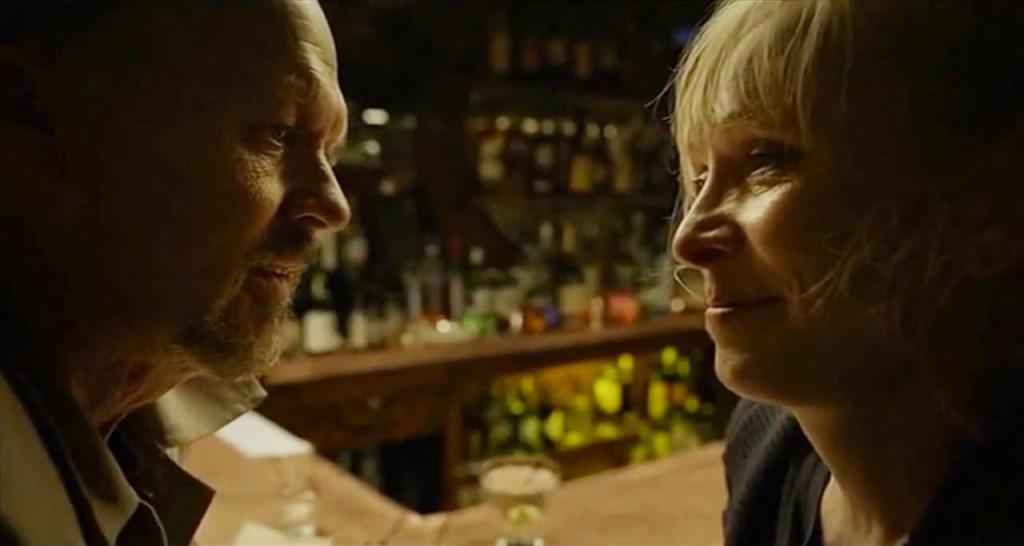
[youtube=https://www.youtube.com/watch?v=7A2Pob0EXTE&w=600]
And did you get what you wanted from life, even so?
I did.
And what did you want?
To call myself beloved. To feel myself beloved on the earth.
This is the epigraph that shows in the opening credits of Birdman, and it’s also the real-life epitaph on Raymond Carver’s tombstone. It serves as a good starting point for a movie that basically seconds as an adaptation for Carver’s famous short story, “What We Talk About When We Talk About Love.” But it’s also a good starting point for Riggan Thomson (Michael Keaton), aka “Birdman,” ex-superhero-of-the-nineties, awash in irrelevance amidst a bigger, newer wave of Marvel stars. Thomson—a caricature of Keaton himself—is a visible fall-from-grace, a balding and paunchy remnant of the Hollywood hero who once wore that bird-mask (a poster still hangs in his dressing room). Now, in a last-ditch effort to matter again, he has shifted everything he has left onto a new project: a Broadway adaptation of a favorite Raymond Carver short story, the same Raymond Carver who, when he was just a teenager, admired his work on stage and told him so. If he lands this, he can be Birdman again, flying above all the average faces on all the average streets.
The film is shot beautifully—the whole thing feels as if there are no cuts but is instead one moving, seamless shot—following the action on-stage and off-, leaving one character and picking up another. In this way, the story of Riggan Thomson is also part of Raymond Carver’s story. And “What We Talk About When We Talk About Love” becomes like one of Shakespeare’s stories-within-a-story, an on-stage, on-screen drama that speaks over and for the theme at large.
In Carver’s short story, four friends sit around drinking gin in the kitchen, talking about the nature of love, what love makes people do, what love does between two people, and how people confuse love into all manners of violence and suffering. The four characters sit around, getting drunk until dark, telling each other stories of men who shoot themselves for love, men who beat up their wives because they love them so much, and wives who still believe it was love even after all the bad stuff happens. As Riggan’s adaptation makes clear, not feeling beloved on the earth is the same thing as not being alive—one of his own characters shoots himself at the end of the play when his love is unrequited; his final words are “I do not exist.”
And yet, one of the major consistencies between Riggan’s life and Riggan’s on-stage personae is the clear misunderstanding of what love means. Riggan has entirely made a mess of his personal life—unfaithful to his wife, absent to his daughter, unaware of life beyond his own ambition—and while his dive into Broadway seems to be a fix-it solution for the person he hadn’t been in Hollywood, it also feels like one more chance to escape obscurity. As his ex-wife Sylvia (played by Amy Ryan) explains, “You have always confused love with admiration.” While Riggan reminds Sylvia that she wasn’t always supportive of his acting work, Sylvia can’t believe that he saw nothing in love beyond his own need for validation, a tenuous benchmark at best. In any world—much more the world of the silver screen, where “Clooney’s chin” can best your effort in the snap of a moment—the fight for relevance and authority is a losing battle. Riggan still can’t believe this cruel fate of obsolescence, that Farah Fawcett died (forgettably) the same day as Michael Jackson.
His daughter Sam (played terrifically by Emma Stone) is the only one who can really make any headway. Fresh from rehab, she is hired backstage to help her dad with the production. Sam, up to the eyeballs in big city sass and hipster nihilism, has no problem seeing through the whole artistic vision of the project. (Throughout the film she’s filling up an entire toilet paper roll in small dashes with her pen, one small square of which marks the entirety of human existence.) Maybe because she’s young, and maybe because she’s been burned by her dad’s absence, she tells him how this is so much less about following a dream and so much more about critical acclaim—acclaim that will lead nowhere and satisfy nothing.
[youtube=https://www.youtube.com/watch?v=GTxh6DHhyzM&w=600]
Sam’s look after the rant says it all. She’s just delivered a crushing blow, and she knows it. She has exposed her father’s dream as the most quotidian pursuits of them all—to be special, to matter, to receive accolades. In the hunt for relevance, Riggan has exchanged the law of Birdman for the law of the theater, and does what we all do, bringing in nothing new but a different manifestation of the same voice: Thou Shalt Be Admired. As Riggan’s agent/attorney/friend Jake (Zach Galifianakis) explains to him, the two questions that matter right now are “Does it sell tickets?” and “Do critics love it?”
It is no surprise, then, that the gatekeeper for Riggan’s comeback is personified in Times theater critic Tabitha Dickinson (Lindsay Duncan), who has a serious chip on her shoulder for Riggan Thompson’s “type”—the Hollywood burn-out who ignorantly tries to reinvent themselves on Broadway. Despite her vocation, she parses no words, telling Riggan, “I’m going to bury your play.” She has not read the script, she has not even seen the previews, but she knows the intention—and as the tastemaker of Broadway, has the power to kill it. Once again, the “love” Riggan needs is held in the arbitrary hands of one biased spectator, a cruel reminder at how fleeting his gasp for relevance is.
One thematic aside is worth mentioning here, which is the cheap-and-easy power of the critic. Riggan’s outburst in the bar at Dickinson is a furious attempt to assuage the power that holds his life in her hands, but it’s also a critique (…) of the very right-handed way criticism happens: a faceless voice gains costless credit for damning the very costly and very vulnerable act of putting one’s heart on-stage. This is all very ironic, seeing as any of us at Mockingbird would no longer have careers if we weren’t naming things and commenting on things, but Iñarritu is making the statement: living is not the same thing as commenting on life, and as much as commentary and criticism may feel life-giving, the real feeling there is akin to the blood rush of pride, of “being like god.” It is no coincidence that Riggan’s mantra, taped to his dressing-room mirror, is a Wallace Stevens line: “Not Ideas About the Thing but the Thing Itself”. There may not be many virtues to Riggan’s vocation, but the vital one is his desperation—his willingness to risk his entire life for this play.
Of course, it’s not that noble. Acting on stage is acting, not living, and while Riggan spouts off to the critic about the sacrifices his line of work entails, he’s also lost to the fact that his marketable value is tied up in a mask he puts on and a role he plays. Riggan is famous, in Hollywood or on Broadway, for playing someone he is not, which is the root of his confusing love and admiration. And this is the nature of the superhero voice in his head, the telekinetic powers of levitation he still believes he has—it is his superego, the self who can fly (instead of taking a cab) and take matters into his own hands (instead of awaiting a critic’s condemnation), who insists in weakness on returning to strength.
In a world where love means admiration, what can you do? In the world of Magical Realism, you fly, up and away from the person you’re worried you might in fact be. And it is this Birdman nature of Riggan which takes him away. But it also throws him, quite literally, off the edge. Like the folly of Icarus, the inner-Birdman—the Law of Who You Must Be To Be Admired—means blowing up in the lights. Riggan’s last moment on-stage is poignant: dressed as a man he is not, but just as desperate as the foiled lover he is portraying, we are mirrored with the audience across the screen from us, clapping at his collapse.
Riggan receives the relevance he’s so desperately fought for—the critical acclaim of his “performance” has put the play on the map. But it’s also mortally disfigured him. It has put him in a hospital bed, has given him a new beaked mask to wear, another “type” to be for the admiration of all. In the hospital room, his friend Jake congratulates him, “This is what you wanted!” Riggan sadly repeats, “This is what I wanted.” In the name of admiration, he is beloved. But it isn’t enough. His pursuit has killed him and he wants no more masks. As he takes off his bandage, to find a disfigured face he’s never known before, he looks in the mirror at the real, ruined Riggan Thomson. He leaves the Birdman in the bathroom, and jumps out the window.
When his daughter Sam comes in, looking out the hospital window and worrying as we do that her father has leapt to his death, all we see is her downward face uplifted, a surprised smile to see her father flying—not dead. Sam’s face is a silent but salient (and superheroic) image of a death and resurrection. It seems that the approval game died and the man rose up again, this time in the knowledge of real love, not his idea of it.

COMMENTS
7 responses to “Not Ideas About Love But the Thing Itself: A Review of Birdman”
Leave a Reply
















Did Riggan really overcome the approval game, dying to its methods, or was he merely swallowed by it? I’ve not figured out the last scene where he looks at his face. When he walks out, it is first time where the Birdman (sitting on the toilet no less) is scene but not heard. Was Riggan “saved” by the love of Sam? Or has he been swallowed up by what he wanted to be?
The description of the play as super-realism, the CGI drenched, explosion scene, I think Riggan was a kind of doombringer to the so-called “pure” art of theater. Was Tabitha the Critic unable to protect her beloved stage? I don’t know. It seems to be a criticism of art and its relentless march into aesthetic orgies.
It’s a stretch to see a death-resurrection, as much as escapism. Riggan never rises above the morass. His flying away seems to be leaving life. The movie left me with a feeling of the ultimately useless triumphalism of Nietzsche’s nihilism. Making your own self and way leaves you nothing.
I wish this review did more with Edward Norton’s character! He is one who has completely lost his ability to distinguish art and life, being only really alive on the stage. I’m not sure what this signifies. But one major theme in the movie seems to be the motif of sight. Something to chew on for a second viewing 🙂
Good stuff,
Cal
Ethan, terrific stuff. I’d agree with you, and say his death/flight does strongly signify overcoming his “man-pleasing-ness” or constant need of approval. After all, that’s what he was, a man-pleaser, and with his death and resurrection, he was a no longer that. He killed his “self”. He was free. Great movie. Great write up.
Cal, thanks so much for the comment.
I think you have something there with the nihilism–the despair of making one’s own way. That meshes well with the mask coming off, with the Birdman on the toilet, and his look at the window at the real birds, it kind of seems to me that that doesn’t necessarily rule out the hope of seeing things a new way. The Wallace Stevens poem that’s referenced in his dressing room mirror has a bird motif, as well; the winter squawk of a baby bird outside the speaker’s window is an address from a reality which comes from outside him:
That scrawny cry—it was
A chorister whose c preceded the choir.
It was part of the colossal sun,
Surrounded by its choral rings,
Still far away. It was like
A new knowledge of reality.
I agree with you. This post needed some treatment on Norton, probably the best performance in the film besides Emma Stone. And I like the point about his stage life. The New Yorker called him a theater “shithead.” To me, he represents utter despair–a man who cannot feel alive but by acting. Perhaps he is an image of the kind of despair Riggan knew as Birdman. I’m interested in the motif of “sight”. Do say more!
A small and perhaps silly observation, but thanks for treating your readers like adults by running those clips from Birdman without adding NSFW or “language alert” or whatever. Not sure when you made that change, and how much or little conversation went on behind the scenes, but it was time for Mockingbird to stop doing that.
Thank you for the analysis… I watched this last night very late and was mesmerized by pretty much everything. I really appreciate the thoughtful insights and there definitely is a lot to chew on here. I wonder how the blend of the movie and reality is significant. I thought it interesting that the writer / director said he wouldn’t do the movie without Michael Keaton, who as in the movie Clean and Sober pretty much left me simply amazed. Are there other reviews or analysis pieces that talk more about the movie that you have found helpful? One last thing… any insights into his “powers”?